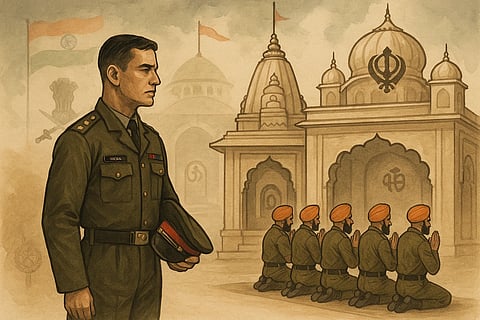
- Union Budget 2026
- Home
- NewsGram USA
- India
- न्यूजग्राम
- World
- Politics
- Entertainment
- Culture
- Lifestyle
- Economy
- Sports
- Sp. Coverage
- Misc.
- NewsGram Exclusive
- Jobs / Internships

Key Points:
Lieutenant Samuel Kamalesan, a Christian officer, was terminated from the Indian Army in 2021.
Kamalesan sought exemption from entering the sanctum during rituals, offering instead to stand outside respectfully, but his request was denied.
The Delhi High Court ruled his act as “indiscipline” under Section 41 of the Army Act, 1950.
Does one have to follow the military traditions of taking part in religious practices other than the one they believe in? The traditional army practices of conducting religious parades are a form of companionship-building activity. According to custom, religious parades foster unity, brotherhood, and esprit de corps—the spirit of mutual loyalty and pride among the members of a group.
Can a non-Hindu or non-Sikh member of a troop follow these customs without compromising or dishonouring their personal religious belief?
The Indian Army has a total of 1.2 million active military personnel, consisting of diverse members belonging to different religions. These religions span Hinduism, Sikhism, Islam, Christianity, Jainism, and others. What if an army officer from a minority religious group refuses to take part in a Hindu or Sikh prayer? Can a personal belief or choice be termed an act of indiscipline?
The prologue of the story reminds us of a Christian army officer who was terminated from his service when he refused to enter the inner part of the Gurudwara. The Delhi High Court, in its ruling in May 2025, termed his action an act of indiscipline.
Lieutenant Samuel Kamalesan joined the Indian Army in 2017 as a member of the 3rd Cavalry Regiment. After just four years since his advent into the military, the Army terminated Kamalesan’s service in 2021 without allowing him access to his gratuity and pension benefits. He was the troop leader of a squad that predominantly consisted of Sikh personnel.
While leading the squadron of 20 Sikh officers, Kamalesan was required to lead the weekly religious parades. The practice of religious parades involved the troops offering their prayer at a place of worship or ‘Sarv Dharm Sthal’.
Kamalesan, who is Christian, claimed that his regiment did not comprise a ‘Sarv Dharm Sthal’ and had only a Mandir or a Gurudwara in the premises. He challenged the court’s ruling of his termination and sought reinstatement.
In the petition written to the Delhi High Court, Kamalesan explained that he was willing to participate in the religious parade by accompanying his team members. However, he sought exemption from entering the innermost sanctum of the Gurudwara or temple when havan, aarti, or puja was practised.
He further wrote that he would remove his belt, wash his hands, wear a turban, and stand outside the temple or Gurudwara whenever required. He did not participate in religious rituals to honour his religion and to avoid offending any of his squad members.
His request for an exemption was immediately denied, and he said that his commanding officer even forced him to participate. Kamalesan wrote in his petition that his superiors verbally abused him and mocked his faith.
They allegedly threatened to end his career. The petition also stated that his officers sent him to a counselling session headed by pastors of the Church and Christian officers, who tried to influence him by reiterating the rationale behind religious parades.
Kamalesan received the final notice regarding his termination from the Army in March 2021. The Delhi High Court subsequently ruled that the dismissal of Samuel Kamalesan was lawful and an “act of indiscipline” on his part.
The High Court held that Kamalesan’s dismissal stemmed from his failure to follow direct orders from his superiors. Under Section 41 of the Army Act, 1950, the court upheld the decision of his dismissal. Section 41 of the Army Act, 1950 deals with wilful disobedience towards a superior officer.
An advocate practising law in the Madras High Court, Jesuit Father A. Santhanam, stated that the decision to dismiss Kamalesan from his services was not correct. He emphasised that the court had overlooked the part where Kamalesan said he did stand outside to show his respect. “Such a punishment constitutes religious coercion and undermines India’s secular character,” said Father A. Santhanam.
Brigadier Neil John, who had served in the military for more than three decades, shared his experience in his statement to Christianity Today. He said that he had participated in religious parades and rituals during his tenure. He believed that an officer must stand with their squad irrespective of the religion they follow.
Neil John also pointed out that Kamalesan's dismissal was a “harsh” decision. He further added, “But to compulsorily expect individuals of other faiths to follow rituals and practices intrinsic to a particular religion is rather harsh.” [Rh/VS]
Also Read:
